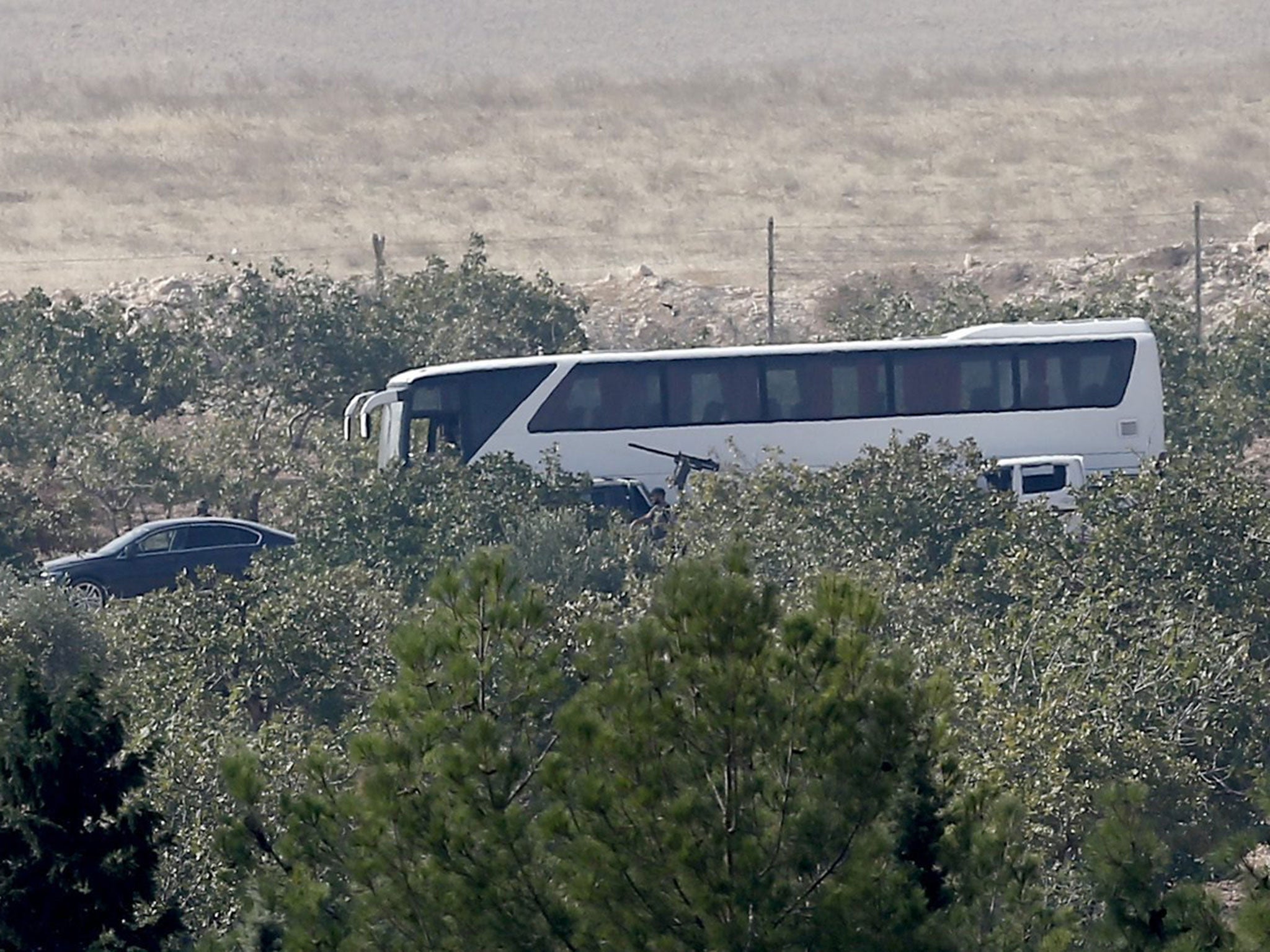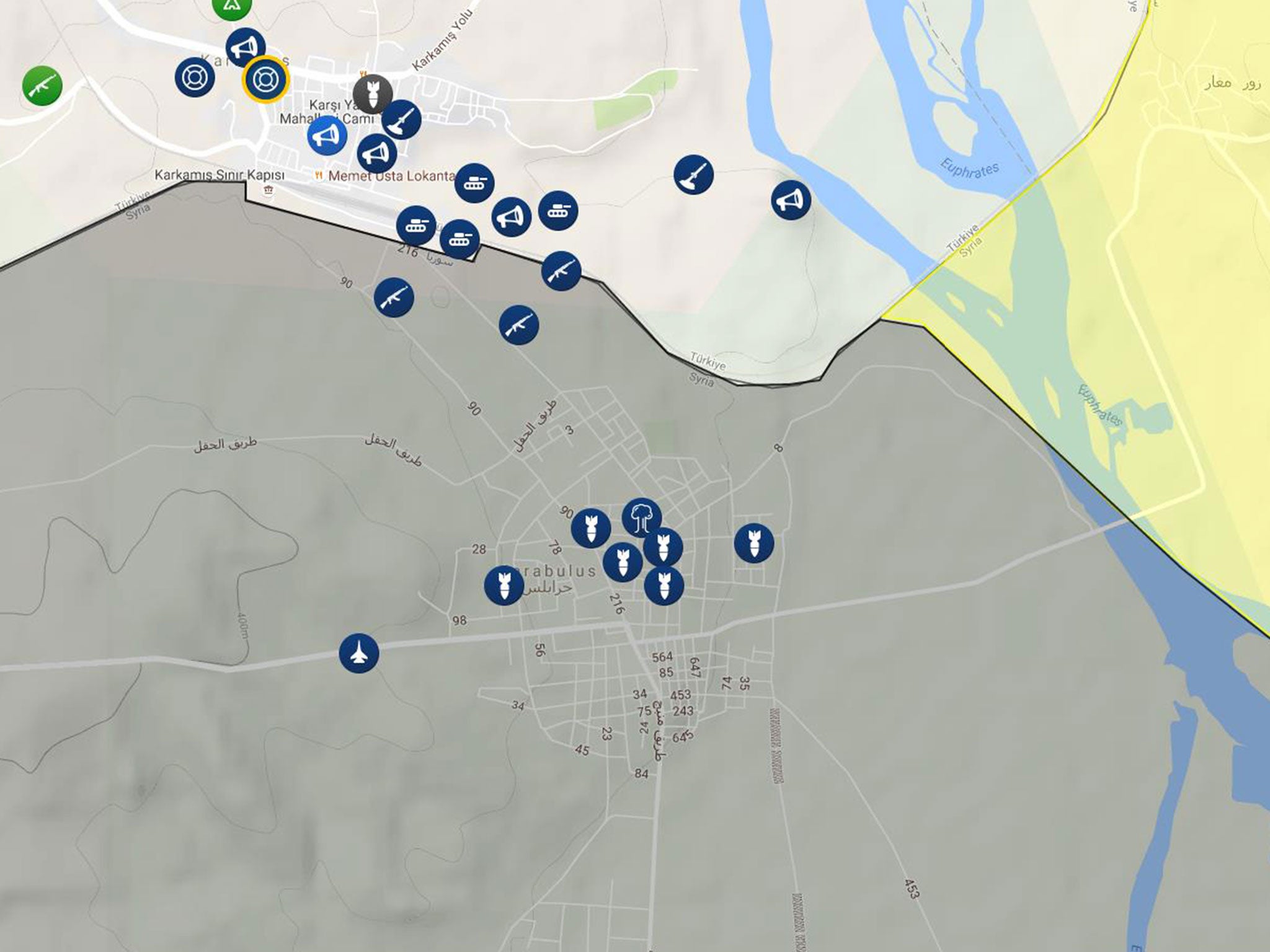Syria war: Turkish tanks cross border in huge operation to drive Isis out of key stronghold
Turkish tanks, rocket launchers and planes hit Isis territory with hundreds of strikes overnight
Turkish tanks have crossed into the Syria as part of a huge operation to drive Isis out of a key stronghold on the border, along with assistance from US fighter jets.
The incursion came on Wednesday morning, following a night of air strikes and shelling around the town of Jarablus.
More than 220 rounds rained down on the area overnight in bombardment that started at around 4am local time (2am BST), with huge explosions lighting up the night sky.
A US defense official said US A-10 and F-16 fighter jets are participating in the cross-border operation launched by Turkey and Syrian rebels groups.
The US is also providing assistance with intelligence and surveillance aircraft overhead.

Turkish media reported that a group of Turkey-backed Free Syrian Army rebels had also entered the region as part of the offensive codenamed “Euphrates Shield”.
There were concerns the fighters could come into conflict with the Syrian Democratic Forces (SDF), a predominantly Kurdish alliance backed by the US-led coalition that has already advanced to within a mile of Jarablus to the opposite bank of the Euphrates River
The SDF has driven Isis out from swathes of northern Syria in recent months, including the city of Manbij, but Turkey has been alarmed by the group’s success, seeing Kurdish groups including the People’s Protection Units (YPG) in control of land stretching almost the entire length of the Syrian border.
Despite being regarded as valuable allies of the US-led coalition, President Recep Tayyip Erdogan has called the fighters “terrorists” and linked them with the separatist PKK group, which is fighting an insurgency in south-eastern Turkey.
His interior minister, Efkan Ala, raised fears of imminent conflict on Wednesday morning after saying that the threat in Syria did not only emanate from Isis but “other terrorist organisations”.
He vowed that the Jarablus operation would continue until the “last threat against Turkey is eliminated”, CNN Turk reported.

Groups including the Islamist Faylaq Al-Sham militia and Nour al-Din al-Zenki movement, whose fighters decapitated a child on video in Aleppo last month, announced they were part of the Jarablus operation.
The offensive came after Isis was blamed for a suicide bombing that killed more than 50 people in the Turkish city of Gaziantep as they celebrated a wedding on Saturday.
The attack was the latest in a string of atrocities blamed on Isis in the country, which has also been targeted by Kurdish separatist groups in recent months
Wednesday was the first time Turkey’s air force has struck a target in Syria since November, when it downed a Russian jet near the border.
Turkish military sources told Reuters Turkish special forces entered Syria while the bombardment continued, with an incursion by ground forces planned to “ensure border security and Syria's national integrity”.
“The Turkish Armed Forces and the International Coalition Air Forces have launched a military operation aimed at clearing the district of Jarablus of the province of Aleppo from the terrorist organisation Daesh [Isis],” said a statement from the Turkish prime minister's office.
The foreign minister, Mevlüt Çavuşoğlu, vowed to “completely cleanse” the terrorist group from border regions on Monday, as shock over the wedding bombing reverberated around the world.
Operations hope to cut off Isis supply lines and smuggling channels for its lucrative trade in oil and looted artefacts, as well as the routes used by foreign fighters to enter the so-called Islamic State.
Turkey remains in turmoil following a failed military coup last month and allies have raised fears that the armed forces have been weakened by huge purges and restructures.
Anger over a perceived lack of international support for the government, and human rights concerns, has seen Mr Erdogan cool ties with the US and EU, choosing to end a diplomatic stand-off with Russia to move towards closer co-operation.
Russia is supporting Bashar al-Assad in the Syrian civil war and the prospect of a military coalition with Turkey is a cause for alarm for Western countries calling for the President’s removal.
The American Vice President, Joe Biden, has arrived in Turkey for talks over the US-based cleric Fethullah Gülen, who officials blame for the coup, and the Syrian conflict.
Join our commenting forum
Join thought-provoking conversations, follow other Independent readers and see their replies
Comments